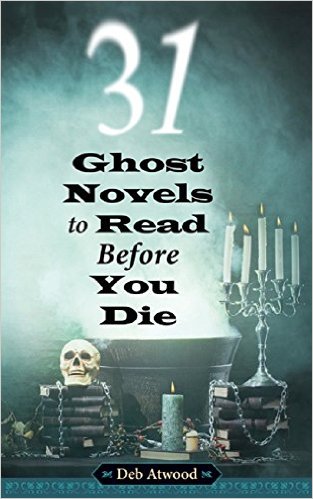Working on one thing at a time, for as long as you need to or feel like it, is a luxury.
This site is now in archives-only mode. Click here to read why.
This site is now in archives-only mode. Click here to read why.
Time for another Book Introduction guest post! This week, we have an introduction to a collection of essays about ghost stories, from writer and ghost story enthusiast Deb Atwood.
31 Ghost Novels to Read Before You Die
by Deb Atwood

I’ve never seen a ghost. And—gasp—I’m not sure I believe in ghosts.
But I love them.
I’ve loved them ever since my mother got us cards to the Hayward Public Library. Every Saturday morning I felt privileged to cross the vast, verdant lawn to the huge double doors (or so they appeared to the child in me) and the seemingly limitless volumes within. It was here I checked out my first short story collection—an anthology of water ghost stories, one of which featured an apparition with dripping, icy fingers. I was nine years old.
Funny, I hadn’t thought of that memory for a long time. Years, probably.
I like the way writer Leslie What links memory to ghosts: “Ghosts are a metaphor for memory and remembrance and metaphorically connect our world to the world we cannot know about” (SF Site). Whatever ghosts are, they have connected our knowable and unknowable worlds since...well, forever. Consider the oldest written text: A Mesopotamian tale called the Epic of Gilgamesh features a helpful ghost. We’re talking 2500 BCE. And that’s a written text, doesn’t even account for all those long ago nights when Neanderthals sat around the campfire with Homo erectus, swapping ghost stories and roasting marshmallows.
I think the reverse of Leslie What’s comment is true, too. I think ghosts connect us to the world we do know about—our own lives. Sometimes they warn us as Agamemnon’s ghost does with Odysseus or the Ghost of Christmas Yet to Come does with Scrooge. They help us see the truth as Hamlet’s father does (even though Hamlet has trouble believing him). For a ghost, gone is the need for ego-stroking or preening or amassing wealth.
You have to agree, one’s motives become pretty transparent when one is transparent.
Behind every ghost there’s a story. Aside from that delicious tingle on the backs of our necks as we read or listen to their tales, there’s that tug at our hearts for whatever misfortune or misdeed compels the unfortunates to wander. The fictional ghosts I love are not scheming to tear your throat out or inhabit your body. No, the ghosts I adore embody love and loss and lost dreams. They yearn (as we do) and they seek.
Ghosts are we.
And really, it’s okay that I’ve never seen one. As Henrik Ibsen’s character Mrs. Alving puts it in the play Ghosts, “I am half inclined to think we are all ghosts,” adding that we inherit ghosts from our parents and find them in texts “gliding between the lines.”
So, luckily there’s no shortage of specters. Since I have not yet had the pleasure (or horror—not sure which) of encountering one face-to-face, I content myself with meeting ghosts in books and film. I’ve learned a lot from these fictional phantoms about love and loss and looking back.
Find Deb Atwood online at her blog Pen in Her Hand or on Twitter (@deb_atwood).
Buy the book at Amazon.
Add new comment